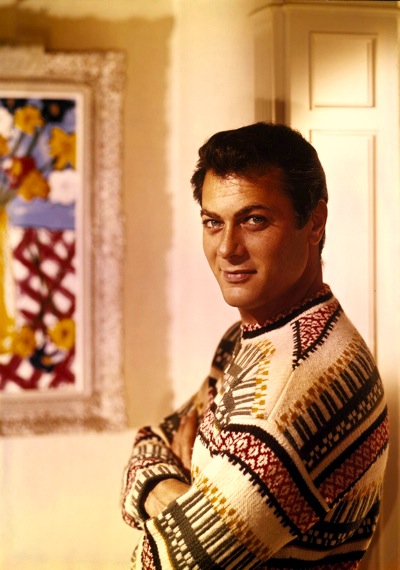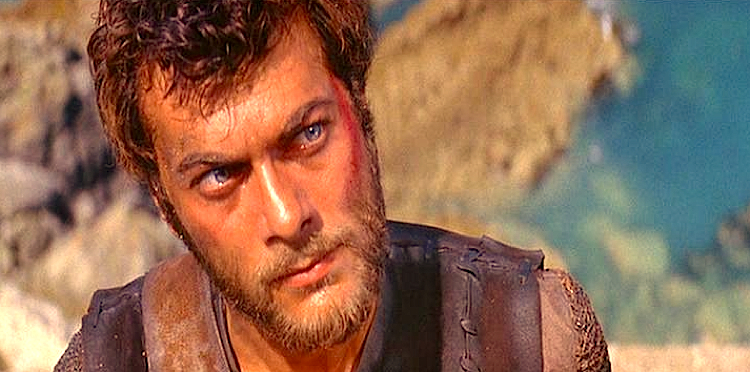
By Jason Apuzzo. I wanted to say a few words about Tony Curtis, who sadly passed away today at age 85.
Tony Curtis was something of a fixture in my household growing up – he almost seemed like part of the family. Isn’t it funny how movies stars can become like part of your family? Back when classic movies used to run on television much more frequently then they do now (classic movies having been – for better and for worse, relegated completely to Turner Classic Movies), Tony Curtis’ cherubic face and delightfully unsoftened Bronx accent would appear all the time on TV – and my father would stop and point at the screen and say, “Look – there’s Tony Curtis!” And I would look, and smile, and always for the same reason: that it just seemed so improbable that this charming, ethnic kid from the Bronx with the soft face and jarring accent would actually be a movie star. And married to Janet Leigh. And would be someone who played heroes, such as the the Viking Erik in The Vikings. All of it seemed so improbable – the kind of thing that could only happen in America.
He seemed to be living The Dream.
Only years later did I learn that things were much more complicated for him – that Tony Curtis (born Bernard Schwartz) grew up desperately poor, speaking only Hungarian until he was age 6. His father was a Jewish tailor, and the family lived in the back of the shop. His mother was apparently a somewhat abusive figure in Curtis’ life; she was at one point diagnosed with schizophrenia, a mental disease which may have been passed on in some form to Curtis’ brother Robert, who was institutionalized. Things were basically very tough for Tony Curtis in his young life. How tough? He and his younger brother Julius were at one point placed in an orphanage for a month because their parents couldn’t afford to feed them. Four years later, Julius was struck and killed by a truck.
This was his young life.
It seems like the movies were his solace. Apparently he saw Cary Grant in Destination Tokyo and Tyrone Power in Crash Dive, and this led him to enlist in the Navy and serve on a submarine tender. The funny part of it is, years later he would ‘serve’ on board a submarine with Cary Grant in Operation Petticoat, and also pull off a delicious Cary Grant imitation in Some Like It Hot. I guess that was his way of thanking a guy who’d inspired him, who’d helped pull him out of what had been a troubled and desperate life.

You were always rooting for Tony Curtis in his movies. The reason, I suspect, is because he never quite seemed as handsome as Kirk Douglas, as commanding as Burt Lancaster, as volcanic and sexual as Marlon Brando, as brilliant and subtle as Laurence Olivier, as ruthless and passionate as Anthony Quinn. Tony Curtis was more like the rest of us, a regular guy from the Bronx who might easily be working (a lá Marty) in a butcher shop – except that this Jewish kid from the Bronx had make it big in Hollywood.
A few thoughts on the The Vikings, my favorite Tony Curtis film. So much of what makes that film compelling is how awkward Curtis seems – like a misfit – in the macho world of the Vikings. Kirk Douglas and Ernest Borgnine seem completely in their element in that film. Tony Curtis? Not so much. The cast of The Vikings is filled to the brim with people who are, alternately, either too beautiful or too sophisticated for Curtis to cope with – the impossibly gorgeous Janet Leigh as Princess Morgana, the cunning and wicked Frank Thring as Aella, or James Donald’s crafty Lord Egbert. [And don’t forget Orson Welles’ basso profundo voice narrating the film.] Curtis basically seems to have nothing going for him in this film except a Bronx accent and a grudge.

And yet … as the story unfolds, we gradually realize that there’s something we’ve underestimated about Tony Curtis’ character: his tenacity, a tensile inner strength – a passion for justice, perhaps? – that drives him far beyond what he initially appears capable of. Curtis’ ‘Erik’ character carries around with him an inner resource of integrity – nicely symbolized by the royal pommel stone around his neck – that will carry him through thick and thin, and against adversaries far more powerful and cunning than he is. This is the side of Curtis that always comes out in Act 3 of his films – the survivor, the tough Bronx kid who climbed out of a tragic life and made it to the top.
And so the character who begins the movie as a pitiful slave will eventually win both the throne of England – and the lovely Princess whom he prizes above all else. And all of it is credible, because Tony Curtis transforms himself convincingly over the course of the film from desperate schlemiel to bad-ass Viking conqueror, a hardened rival to Kirk Douglas’ fatally sentimental ‘Einar’ character. Does Tony Curtis give a great performance in the film? You bet he does – in fact, it’s iconic. I’ve always suspected, in fact, that the big emotional cues from The Empire Strikes Back were borrowed more or less unaltered from The Vikings, and from Tony Curtis’ performance specifically. If you’ve seen both films, you know exactly what I’m talking about.
Govindini and I had the chance to meet Tony Curtis a few years ago. He was, as you can imagine, courtly and old-school. He had a kind of impish charm that carried over from every movie performance I’d seen him give as a kid. You had the sense standing next to him that he’d lived a great life, and was grateful for the opportunity that America and Hollywood had given him. Even though the industry had to some extent forgotten him, he was neither bitter nor remorseful – the twinkle was still very much in his eye, and he was still living The Dream. Hell, what did he have to complain about? The man had enjoyed six wives – from Janet Leigh to Jill Vandenberg! Not bad for a Hungarian kid from the Bronx.
As we were chatting, he smiled at one point, looked Govindini over, and kissed her hand. Then he winked at me. I laughed. He looked and acted like a sweet young charmer that day, and I’ll bet he still is. I imagine he’s chatting up Janet Leigh somewhere right now.
Posted on September 30th, 2010 at 2:08pm.
Nice eulogy Jason. Tony Curtis was sort of that bridge movie star from the first generation of Great Stars to just when the last crop of actual actors/stars came in the early 70’s. (Name 5 great actors and/or actresses that started in the 80’s to now? I can’t even regardless of their politics) I’m talking from Carey Grant to the Jack Nicholson, which Tony happened to work with both. I don’t know what happened to him in the 70’s (nose candy then unreliability?) and yes he continued to work but nothing memorable after Last Tycoon.
Thanks, John.
A heartfelt tribute to a fine actor. Nice work Jason. Enjoyed also your take on his role as Erik in THE VIKINGS (a favorite of mine as well).
Thinking back, Curtis excelled in playing the average Joe, wanting to fit in, wanting something better but refusing to being bullied or taken advantage of whether sympathetically as HOUDINI or Ira Hayes in THE OUTSIDER or unsympathetically as the fascinating but unctuous Sidney Falco in SWEET SMELL OF SUCCESS. “Match me Sydney.”
Your writing of his seeming “inner strength, passion for justice, driving him beyond what he looks capable of” reminds me of the scene in SPARTACUS where it’s Curtis as the gentle, poetic, “singer of songs” who is the first to rise to his feet and defiantly shout to Crassus and his Legionaires: “I AM SPARTACUS!” not the former gladiators, men of war, who surround him.
Thought you might be interested to know the sub tender that Curtis served in was the USS Proteus (AS-19). I saw an interview inwhich he spoke of witnessing the Japanese surrender ceremony in Tokyo Bay from her signal deck .
By chance I would follow in his footsteps 31 years later when, as an 18 year old Sailor fresh out of boot camp I reported aboard the Proteus in 1976. She would be the first of 5 ships I served in during my 20+ years in the U.S. Navy but the only one that could boast of having a future Hollywood star serve aboard her.
Curtis was proud of his service and quietly supported the Navy throughout his life.
The foyer of the Navy Enlisted Club in Pearl Harbor Hawaii is decorated with several large and beautifully rendered impressionistic paintings of Hawaiian scenery.
If you look around carefully you might spot a simple brass plaque stating that the works were painted and contributed by Signalman 3rd Class Bernard Schwartz USN.
Speaks alot about the man.
Sanjuro, that is so touching – I did not know that story about the paintings. All this means a great deal to me because my own father served very proudly in the submarine service. In fact, he was just in Hawaii visiting Pearl Harbor a few weeks ago.
And how extraordinary that you served on the same ship as Curtis! Thanks so much for your service. I envy you. I considered choosing the Navy as a career for myself, and I sometimes wonder about not doing it.
Incidentally, I’ll just mention another former Navy guy who was quietly heroic in his own, unassuming way: Humphrey DeForest Bogart.
Jason, There is a series published by the Naval Institute Press that I think you’d enjoy:
Written by James E. Wise Jr.and Scott Brown : STARS IN BLUE covers actors who served in the U.S. Navy and U.S Coast Guard, STARS IN THE CORPS covers the U.S.Marines, STARS IN KHAKI, the U.S. Army/ U.S Army Air Corp and the U.S. Air Force, INTERNATIONAL STARS AT WAR contains the military service of actors such as Basil Rathbone, Hardy Kruger, Alain Delon, Toshiro Mifune and David Niven.
I came away with a different perspective , a great deal of respect and a better understanding of how military service motivated and influenced many of these actors both on and off the screen.
To quote Douglas Fairbanks Jr. Capt. USN: “The acting profession is best practiced by those who have known the extremes of life’s experiences.”
Thank you, Sanjuro, that’s a wonderful recommendation!
Sanjuro, I loved your quote by Douglas Fairbanks. So many of the great actors/actresses went through the crucible of the Great Depression, World Wars and Police Actions. Today’s actors/actresses compared to the previous generation did not have to grow up in anything comparable. They’ve grown up in in the steady drip of liberal narrative for over fifty years.
But some of us had Reagan …
Another great one has passed.